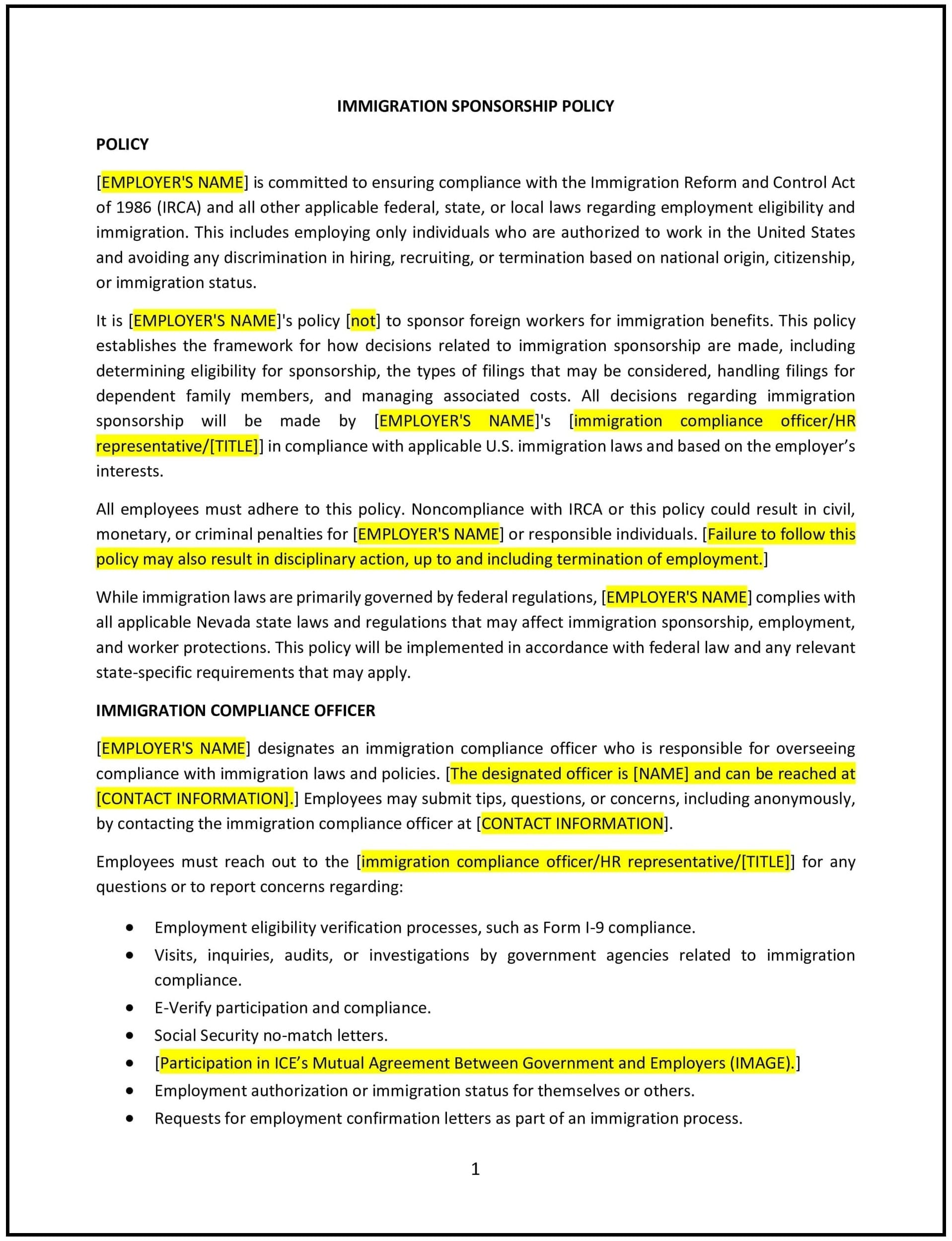Immigration sponsorship policy (Nevada): Free template
Got contracts to review? While you're here for policies, let Cobrief make contract review effortless—start your free review now.

Customize this template for free
Immigration sponsorship policy (Nevada)
This immigration sponsorship policy is designed to help Nevada businesses support employees requiring sponsorship for work authorization. It outlines the company’s approach to sponsoring work visas and providing necessary resources to employees, while ensuring compliance with U.S. immigration laws.
By adopting this policy, businesses can attract global talent, enhance legal compliance, and provide clear guidance to employees about the sponsorship process.
How to use this immigration sponsorship policy (Nevada)
- Define sponsorship eligibility: Specify the types of positions eligible for immigration sponsorship, focusing on roles that are critical to the company’s operations or require specialized skills.
- Outline the sponsorship process: Provide a step-by-step overview of the sponsorship process, including obtaining labor certifications, filing visa petitions, and adhering to timelines.
- Address financial responsibilities: Clarify which costs the company will cover during the sponsorship process (e.g., legal fees, filing fees) and which expenses, if any, are the employee’s responsibility.
- Provide documentation requirements: List the documents employees must provide to initiate the sponsorship process, such as proof of qualifications, identification, and previous immigration status.
- Establish compliance measures: Emphasize the company’s commitment to complying with federal immigration laws, including accurate record-keeping and reporting.
- Explain visa maintenance: Outline employee responsibilities for maintaining valid immigration status, such as attending visa interviews, adhering to visa conditions, and notifying the company of status changes.
- Detail support for dependents: If applicable, explain whether the company offers assistance for dependents (e.g., dependent visas or other resources).
- Set termination policies: Clarify the company’s approach to sponsorship termination if an employee resigns or is terminated, including any obligations to notify immigration authorities.
Benefits of using this immigration sponsorship policy (Nevada)
This policy provides several key benefits for Nevada businesses:
- Attracts global talent: Clear sponsorship guidelines help businesses attract skilled international candidates for critical roles.
- Ensures compliance: Adherence to U.S. immigration laws minimizes the risk of legal penalties or complications during the sponsorship process.
- Enhances transparency: Employees gain a clear understanding of the sponsorship process and their responsibilities, reducing confusion and miscommunication.
- Supports employee retention: Sponsorship demonstrates the company’s commitment to investing in its employees, fostering loyalty and long-term retention.
- Strengthens organizational reputation: A well-structured sponsorship policy enhances the company’s reputation as an inclusive and globally minded employer.
Tips for using this immigration sponsorship policy (Nevada)
- Communicate the policy clearly: Ensure all employees understand the policy and the company’s process for providing immigration sponsorship. Include this information during onboarding and in relevant communications.
- Work with legal experts: Partner with qualified immigration attorneys to navigate complex visa requirements and ensure the sponsorship process complies with all legal obligations.
- Monitor policy compliance: Regularly review internal processes to ensure compliance with U.S. immigration laws, including maintaining accurate employee records and adhering to sponsorship conditions.
- Provide regular updates: Keep sponsored employees informed about the status of their applications and any changes to immigration laws that may impact their status.
- Review the policy periodically: Update the policy as needed to reflect changes in immigration laws, company practices, or employee needs.